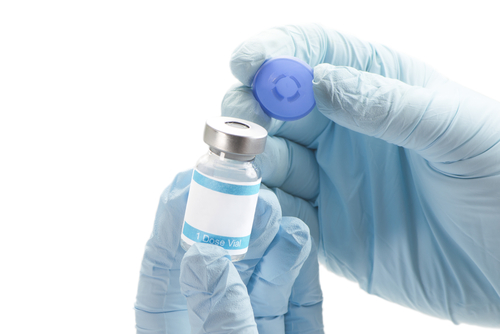Report Describes Rare Case of CAD Linked to Pneumococcal Vaccination in Adult
Written by |

A recent case report alerts clinicians to the fact that cold agglutinin disease (CAD) can arise as a complication of Pneumococcal vaccination. This is the first documented case of an adult who developed CAD associated with a specific self-reactive antibody (anti-Pr) following pneumococcal vaccination.
The study, “Anti-Pr antibody induced cold autoimmune hemolytic anemia following pneumococcal vaccination,” was published in the journal Clinical Case Reports.
Cold agglutinin disease (CAD) is a rare autoimmune disorder in which the immune system produces high concentrations of autoantibodies that mistakenly attack and destroy the body’s own red blood cells (hemolysis). These antibodies are typically cold-reactive, which means they are more active and cause worse effects under low temperatures.
Signs and symptoms of the disease include those related to anemia (low red blood cell count), such as fatigue; and jaundice, a yellow color in the eyes and skin that indicates the liver is having trouble metabolizing wastes caused by blood cells breaking down.
The condition can stand as a disease itself or emerge secondary to other underlying conditions such as an infection, another autoimmune disease, or certain cancers. Its exact causes, however, are unknown.
Although uncommon, CAD can be associated with anti-Pr autoantibodies, i.e. antibodies that recognize certain sugar molecules at the surface of red blood cells. Most such cases are associated with infections (e.g. rubella, varicella, Mycoplasma pneumoniae, Epstein-Barr virus, and cytomegalovirus) or lymphoproliferative disorders. A few other cases have been attributed to vaccination, most of the time in children.
This is the first reported case of cold antibody disease associated with anti-Pr antibodies and vaccination in an adult.
The report describes the case of a 72-year-old man who presented at the hospital after a pneumococcal vaccination.
He had anemia (seen as low hemoglobin in blood tests), jaundice, and shortness of breath. The patient had been implanted with a cardioverter-defibrillator (ICD) two months before, but was in stable health at the time.
His past medical history included congestive heart failure, type II diabetes, and high blood pressure, but he had no prior history of anemia and never needed a blood transfusion in his life.
Symptoms started one week after he received the pneumococcal vaccine Prevnar 13, used for the prevention of pneumonia and invasive disease caused by Streptococcus pneumoniae bacteria.
Extensive laboratory tests and CT scans ruled out any infections or cancer, but revealed the presence of cold autoantibodies with anti-Pr reactivity, based on which the patient was diagnosed with CAD. The cause was attributed to vaccination with Prevnar 13.
Doctors decided on treatment with blood transfusions and a course of the immunosuppressant prednisone (a steroid), while at home, with taper over two months.
The transfusions gradually raised his hemoglobin to normal levels five months after initial presentation; it is uncertain whether prednisone also helped improve his clinical course. Lab tests at that time showed that anti-Pr antibodies still persisted, though they were overall less self-reactive.
It is well-established that vaccinations can trigger the formation of autoantibodies. In rare cases, this reaction is serious enough to result in CAD. Several case reports implicate vaccines as the cause of CAD in infants, children, and adolescents, including the diphtheria‐pertussis‐tetanus (DPT), typhoid fever, polio, and measles-mumps-rubella vaccines.
Fewer cases implicating vaccines in CAD have been reported in adults. Only four reports of adults who developed the disease after having a flu vaccine exist.
Recent case reports of CAD linked to anti-Pr antibodies have been successfully treated with approaches that included plasma exchange, and a combination of immunotherapy with eculizumab (brand name Soliris) and rituximab (brand name Rituxan). Here, the patient was stabilized with a single blood transfusion at the hospital, followed by two additional units of red blood cells during follow-up.
“In summary, this report serves as a unique example of severe autoimmune hemolytic anemia from anti-Pr that developed in the setting of pneumococcal vaccination with Prevnar 13,” researchers said. “Clinicians should be aware of this potential complication in their patients following vaccinations.”





